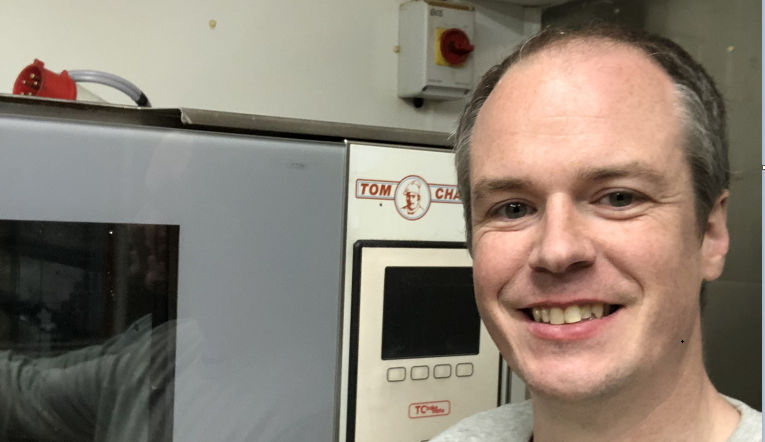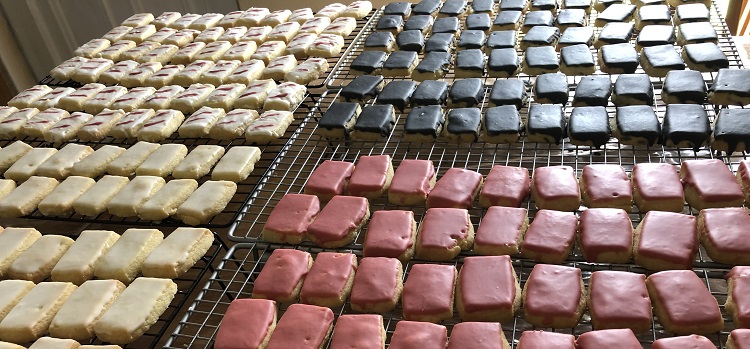From a kitchen table in Northern Ireland to selling in the USA

Posted: Wed 29th May 2024
Michael Thompson is the epitome of the phrase 'kitchen table entrepreneur'.
After quitting his job and retraining as a chef, he came up with the idea of making biscuits containing alcohol. They proved so popular that one order led to Michael baking 3,500 biscuits using his home oven.
But there's a limit to the number of trays of sweet treats you can store in a family kitchen, so he set up his own micro-production factory.
The Northern Ireland-based entrepreneur tells the story of Iconic Biscuits and how the Amazon Small Business Accelerator e-learning programme has helped him along the way.
How did your entrepreneurial journey start?
I originally started out doing web design but wanted to do something that was better cash flow managed and a product business.
At the time, I was a scuba diver and decided to sell underwater camera equipment. No one else was really doing it in Ireland so I taught myself PHP. I bought The Idiot's Guide to PHP and worked through the book and built an e-commerce site.
It did very well. It became the biggest marine supplier in Ireland and I supplied scuba divers all over the world but due to a supplier issue, I lost the business.
Watch this webinar to understand the elements you need to create an e-commerce store:
So how did you end up selling biscuits?
For my last big job, I did a lot of travelling. My daughter had just been born and I spent a week away. I came back and she looked totally different. I didn't want to do it again, so I quit.
My wife was working as a nurse and was happy to take on the shifts. I stayed at home to look after the children but also trained part-time as a chef. I thought about going into food sales for restaurants and hotels but also wanted to run my own business.
The only thing I could make in my kitchen at home without a huge amount of regulation and the complexities of logistics was biscuits.
There are lots of custom cookies out there but I wanted something I could turn into a big business. It took six months working through different legislation and lots of trial and error before I came up with a biscuit.
I researched through Google and looked up what people like. I bought all the top-selling biscuits, measured them with a ruler and looked at what ingredients people used. Further research told me which flavours to make and how to package them.
How have you built sales?
I had a job in an aircraft factory and I was selling loads of biscuits in the factory. Someone suggested I send them to the Try Channel in Dublin, an online channel with Irish people testing unusual Irish-made foods. They featured me and I had 150 orders from America in the week up to Christmas.
I ran the business part-time for a few years but then was made redundant from my aircraft factory job due to the pandemic. It was time to go full-time.
I managed to get a personal loan, which I've used to fund a micro biscuit factory as I like to call it.
What have been your key challenges?
The complexities of food production regulations nationally and internationally are staggering but the information is readily available. It just takes time to research, learn and apply it. The real challenges are the unpublished knowledge, where you have to question dozens of companies on every aspect of production; like which type of plastic works with which machine, and whether it can be replaced with something eco-friendly.
I read every whitepaper I could find on every type of production machine and the materials it uses. I can tell you no end of boring things about the composition of film for wrapping biscuits.
Funding has been non-existent as a start-up moving from part-time. If I was starting fresh there are grants but because I've been trading, I'm considered an established business.
Funding is then based on previous turnover, which as a part-time business was tiny. To fund the business, I started to look for larger orders on the condition my lead time would be weeks and months instead of days. It's a harder sell, but it gave me the confidence to get a personal loan and go for it.

What tips have you picked up from watching the Amazon Small Business Accelerator e-learning videos?
I got an email about the Amazon Small Business Accelerator and immediately replied. It was the perfect timing for the business.
I worked through the videos and made a list. There's something in every video, especially the case studies of Amazon sellers such as Nudie Snacks and Coconut Merchant. It's when seeing other people's businesses that you realise they were in the same position. They started out small and now they have a warehouse and a forklift.
There's a great video regarding the 'About Us' page on a website. I looked at 'About us' pages on other people's websites but didn't value my own. I went back and revisited it and thought there was lots of information missing. I have a background in marketing and PR, so I had a press page ready to go but the value of an 'About us' page hadn't occurred to me.
I have also watched videos about selling on Amazon, especially the FBA [Fulfilment by Amazon] side of things. As an existing Amazon seller, I've already used some of the tools and services but there's lots more to it and seeing the videos gives you an idea of what you can do. I found the tips on how to lay out your product listings particularly useful. I've gone back and revisited all my titles and descriptions. It has made a big difference.
How did COVID-19 impact your business?
It was tough in that I lost a job and because of the structure of the business, I didn't qualify for COVID-19 schemes.
But looking on the bright side, although I was forced out of my job, it meant I'm now growing the business. It's brilliant and I love doing it but it's also slightly terrifying!
Online sales went up and everyone I talked to liked that it was a new product and something they could sell. They were excited about it, they loved the biscuits and they loved the design, the brand and the flavours.
What's your advice for other business owners?
Make a list of what you want to achieve and refine that list to what you can actually do and how long it will take. Then work the list, relentlessly.
Think about how you can automate. Lots of businesses are craft-based and very hands-on, but if you can't scale the business, you're going to be doing that forever.
The free Amazon Small Business Accelerator e-learning programme is advice from more than 30 business experts in 218 bitesize videos.
If you're already an Enterprise Nation member, log-in to your learning dashboard to access the e-learning.
If you're not an Enterprise Nation member, you can join the Amazon Small Business Accelerator for free here.
Get business support right to your inbox
Subscribe to our newsletter to receive business tips, learn about new funding programmes, join upcoming events, take e-learning courses, and more.
Start your business journey today
Take the first step to successfully starting and growing your business.
Join for free
